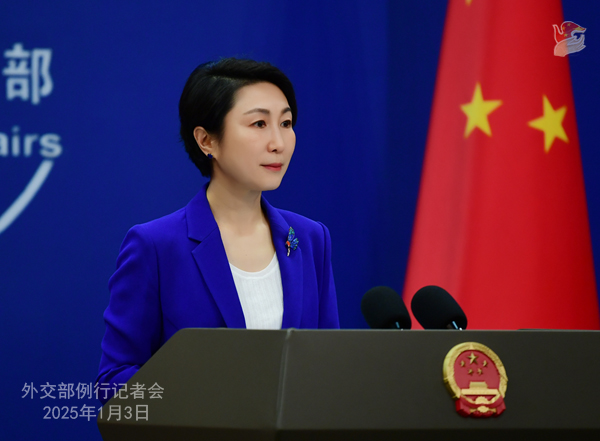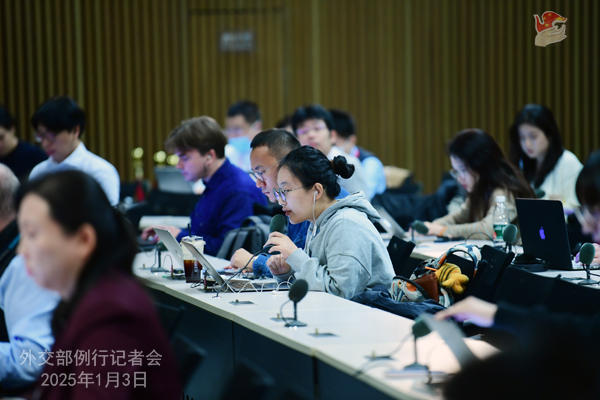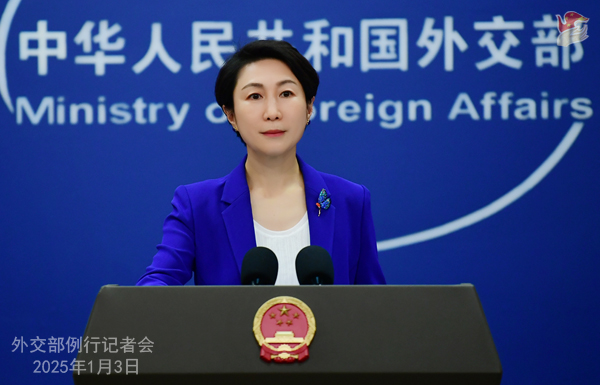
Member of the Political Bureau of the CPC Central Committee and Minister of Foreign Affairs Wang Yi will visit Namibia, the Republic of the Congo, Chad and Nigeria from January 5 to 11 at the invitation of these countries. This will be the 35th consecutive year that Chinese foreign minister visits Africa on the first overseas trip at the start of the year.
CCTV: What is the significance of Foreign Minister Wang Yi’s visit to Africa on the first overseas trip of this year? What does China hope to achieve through this trip?
Mao Ning: Foreign Minister Wang Yi’s visit to four African countries will mark the 35th year for the Chinese foreign minister to make Africa his first overseas destination at the start of the year. At the Beijing Summit of the Forum on China-Africa Cooperation (FOCAC) last year, President Xi Jinping proposed that bilateral relations between China and all African countries having diplomatic ties with China be elevated to the level of strategic relations, and that the overall characterization of China-Africa relations be elevated to an all-weather China-Africa community with a shared future for the new era. President Xi Jinping noted that China and Africa should jointly advance modernization that is just and equitable, open and win-win and eco-friendly, puts the people first, features diversity and inclusiveness, and is underpinned by peace and security, and take ten partnership actions, which were well-received by Africa. Namibia, the Republic of the Congo, Chad, and Nigeria are all China’s friendly cooperation partners. The purpose of Foreign Minister Wang Yi’s upcoming visit is to implement the outcomes of the FOCAC Beijing Summit and deepen practical cooperation across the board for sustained and substantive growth of China-Africa relations.
Global Times: The Research Center on Building a Community with a Shared Future for Mankind was officially inaugurated in Beijing yesterday. Could you share more information with us? What role is this institution going to play in the future?
Mao Ning: The inaugural ceremony of the Research Center on Building a Community with a Shared Future for Mankind was held in Beijing yesterday. Member of the Political Bureau of the CPC Central Committee and Minister of Foreign Affairs Wang Yi inaugurated the Research Center and delivered a speech.
Building a community with a shared future for mankind is a major original idea of General Secretary Xi Jinping and the core concept of Xi Jinping Thought on Diplomacy. It is China’s answer to the question of “what kind of world to build and how to build it” and has great significance for the times. As Foreign Minister Wang pointed out, the vision of a community with a shared future for mankind demonstrates the founding mission of the CPC, carries forward the fine traditions of Chinese culture, demonstrates the power of scientific theories, and expounds on China’s stance in the face of changes unseen in a century. China’s vision of a community with a shared future for mankind delivers benefits to the world. This initiative has grown into consensus and been translated from a vision to practice, and is driving positive and profound changes in today’s world and increasingly becoming the most important public good with major global significance.
The Research Center on Building a Community with a Shared Future for Mankind will engage in more in-depth studies and publicity on and personnel training for the vision of a community with a shared future for mankind. It will provide support for advancing the building of a community with a shared future in the fields of theory, policy, discourse and personnel.
Beijing Youth Daily: January 1 of this year marks the third anniversary of the entry into force of the Regional Comprehensive Economic Partnership (RCEP). Could you elaborate on the outcomes achieved by RCEP over these years and outline China’s expectations for RCEP’s development in the future?
Mao Ning: The Regional Comprehensive Economic Partnership (RCEP) covers more population, involves more trade and has more potential to grow than any other free trade agreement in the world. It has significantly boosted economic integration within the Asia-Pacific region, created enormous market opportunities for its member states and lifted up the international community’s confidence in multilateralism. Research by the Asian Development Bank shows that by the year 2030, RCEP will contribute US$245 billion of economic growth to countries in the region and generate 2.8 million new jobs.
As the largest economy in RCEP, China is committed to the comprehensive and high-quality implementation of the agreement. We will continue to promote the upgrade of free trade in the Asia-Pacific for common development and prosperity.

AFP: On the US and China, the Biden administration said on Thursday that it was considering a new rule that could restrict or ban Chinese drones in the US. The Biden administration said that they could do that out of national security concerns. Is China concerned about this potential move from the US?
Mao Ning: China firmly opposes the US overstretching the concept of national security, which disrupts and restricts normal economic and trade exchanges, and undermines the security and stability of the global industrial and supply chains. We will take all measures necessary to firmly safeguard our lawful rights and interests.
Antara: The Indonesian Ministry of Health recently released a statement in response to the spread of influenza A and other respiratory diseases reportedly circulating in China. The statement addresses a video circulating on social media that shows a hospital in China overwhelmed with patients suffering from flu. Does the Foreign Ministry have any comment on this?
Mao Ning: I would like to refer you to competent Chinese authorities for the details.
Respiratory infections tend to peak during the winter season in the Northern Hemisphere. Recently, the National Disease Control and Prevention Administration of China held a press conference to share information about the prevention and control of respiratory diseases in China during the winter time. The diseases appear to be less severe and spread on a smaller scale compared with the previous year. I can assure you that the Chinese government cares about the health of Chinese citizens and foreigners in China. It is safe to travel in China.
Bloomberg: I just like to ask a little bit more about the export control restrictions that were introduced or announced yesterday. Especially, I’m interested in the ones pertaining to the restrictions on certain technologies that are used to make battery components and the processing of two crucial metals. I realized the Ministry of Commerce issued a statement, but can you help us understand from a geopolitical perspective or diplomatic perspective? What might be some of the intentions behind these moves? How might we interpret them?
Mao Ning: I’d refer you to the Ministry of Commerce for anything specific. More broadly, in light of actual needs and drawing on common international practice, China enforces fair, reasonable and non-discriminatory export control measures in accordance with the laws and regulations.
Kyodo News: It was reported that China, Japan and the ROK will hold a meeting of foreign ministers of the three countries in Tokyo in February. Can you confirm this?
Mao Ning: I have no information to share at the moment.
